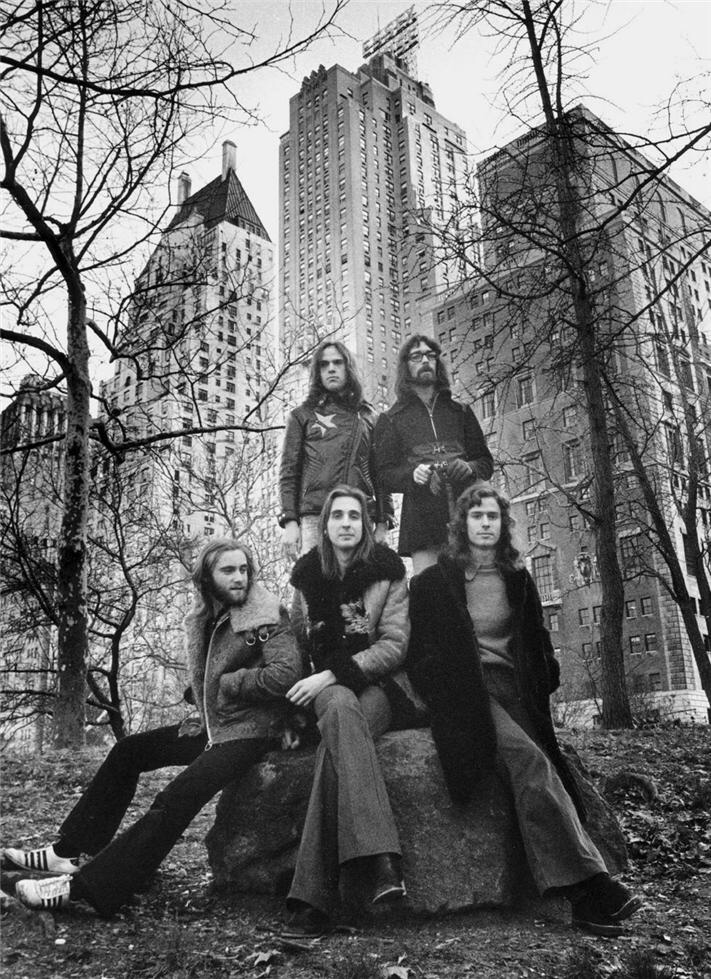
I’m quite keen to continue covering swathes of work from my favourite musical artists. With Genesis this basically means from when Phil Collins joins up to the 1980s, or put another way, the decade of the 1970s. So mostly the Peter Gabriel era, but also the earlier Phil Collins period, when they were still more prog rock, rather than clever pop.
Discography:
From Genesis to Revelation, 1969,
Trespass, ‘70,
Nursery Cryme, ‘71,
Foxtrot, ‘72,
Selling England by the Pound, ‘73,
The Lamb Lies Down On Broadway, ‘74,
Trick of the Tail, ‘76,
Wind & Wuthering, ‘76,
Then There Were Three, ‘78,
Duke, ‘80.
Not sure if I’ll do any of the albums after Duke? Indeed, I may stop at W&W. It’s really their ‘70s prog-rock era that interests me most, and within that the earlier era, with Peter Gabriel is, at present my favourite.
ALBUM REVIEWS:
Trespass, 1970
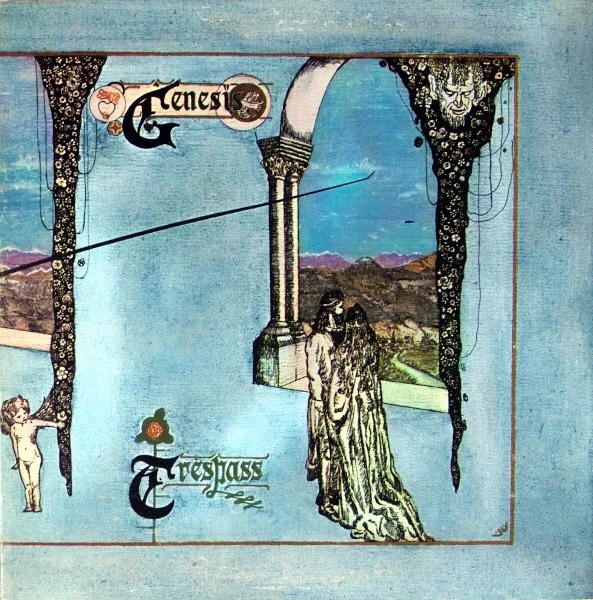
After a debut recorded whilst still at school, by a band aged 15-17, and comprising efforts aimed squarely at pop, Genesis came back, after exams, and …
Nursery Cryme, 1971
Foxtrot, 1972
Selling, 1973
Lamb, 1974
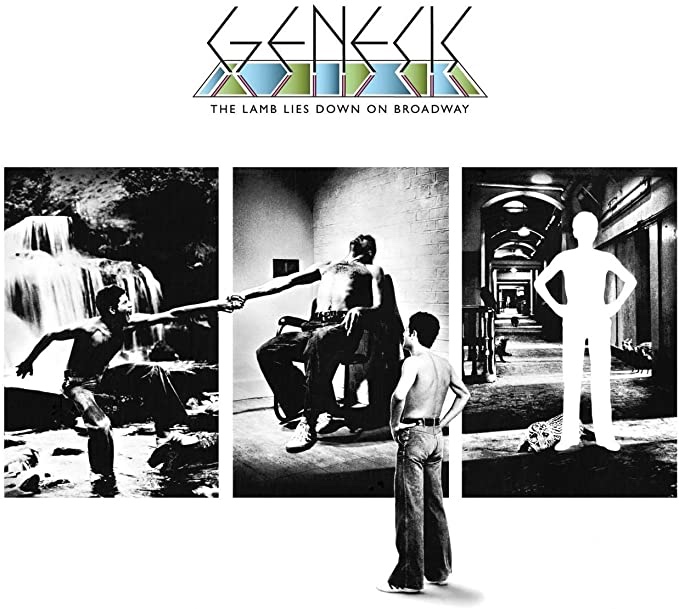
Peter Gabriel goes out in style.
I’m not totally sold on the whole ‘concept album’ aspect of prog. It’s a bit too much like musical theatre for me. Something I’ve never really dug. And the whole theatrical side of prog can be the least appealing aspect of it, partic’ in hindsight. At least for me
So the whole story schtick, with the associated imagery, and Gabriel’s surrealism gone long-form, none of this is what attracts me to or is what I really enjoy about Genesis. What I enjoy, pure and simple (in a manner of speaking!) is the music. The sonic worlds they create leave more room for my own personal response to the synaesthetic and poetic aspects of what music, as the most inherently abstract of the arts, can potentially be.
Having said that, undoubtedly the very attempt to tell a story across a double-album does of course have its consequences, such as the bookending (-ish) with the two ‘on Broadway’ variants. And this aspect of the ‘grand project’ I find less irksome. Indeed, it can give this more ‘pop’ type sound world something more akin to the scale and scope of what’s commonly called ‘classical music’. And that can be, in the right hands, as here, a good thing.
And as Peter Gabriel’s final work with the band, it’s a pretty magnificent way to bow out. I’ve often wondered, esp’ when watching film or video footage of the group, what the internal band chemistry around Gabriel was like.
The rest of Genesis are very focussed on their jobs as musicians. Gabriel, with his bizarre hair cut, exaggerated mannerisms, costumes, and flirtations with instrumental involvement – the flute and tambourine aren’t too unusual, but his own personal kick drum? that’s a bit odd – cuts a lone and very pronounced theatrical figure. Part vaudeville, part po’-mo’ neo-Dadaist performance art, I can’t help but feel it might’ve been both blessing and curse.
The blessing is that it draws attention, the curse that it draws attention. And as an interview included in the fabulous concert footage from Paris, ‘73, below, testifies, Gabriel’s pop star antics can become a distraction from the ‘pure music’ side of Genesis.
A Trick of the Tail, 1976
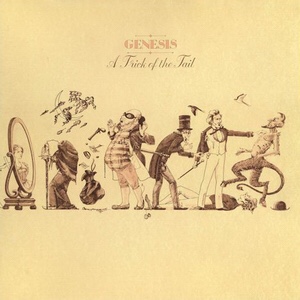
The first post-Gabriel album is, perhaps a little surprisingly, a relatively smooth transition. Musically and lyrically things appear, at first glance, to be little changed. And Phil Collins sounds remarkably Gabriel-esque.
But, truth be told, something has changed. Well, obviously… Gabriel is gorn!!! But that does have a knock-on effect. Even though the material seems very similar. It’s hard to quantify precisely how and why this might be so. But it indubitably is!
It’s interesting that the first two numbers are heavily vocal, and have no drums or percussion. Almost as if they’re settling Collins into his new lead vocalist role by temporarily switching off the drumming! Dance On A Volcano and Entangled are very much standard ‘70s Genesis lyrically, melodically and harmonically.
Once the drums are back in, on track three, Squonk, and the remainder of the album, it all sounds even more Genesis-ish. Although, having said this, there is something imperceptibly changing.
For me this album reaches its greatest heights on Ripples and the title track. Ripples could easily have been happy at home on a Gabriel-era album. But the title track, A Trick Of The Tail, sounds like a band feeling it’s way tentatively into new territory. And doing so very effectively.
Los Endos is, for the most part, pretty frantic, and one can’t help feeling there’s more than a little Brand X jazz-fusion vibes entering the picture here.* Tony Bank’s synth sounds help anchor things in Genesis territory, but the frantic hyperactive drum and bass combo may sound, to some, a touch like ‘trying too hard’, perhaps?
I like Trick of the Tail. A lot. It’s still very much classic ‘70s Genesis. But you can hear, with Gabriel gone and Phil on the mic’, that things are starting to shift.
* Brand X were (indeed, still are!) are jazz-fusion group formed in 1975, for whom Phil Collins was the drummer for a number of years. And Trick of the Tail came out in ‘76, the same year as Brand X’s debut disc, Unorthodox Behaviour.
Wind & Wuthering, 1976
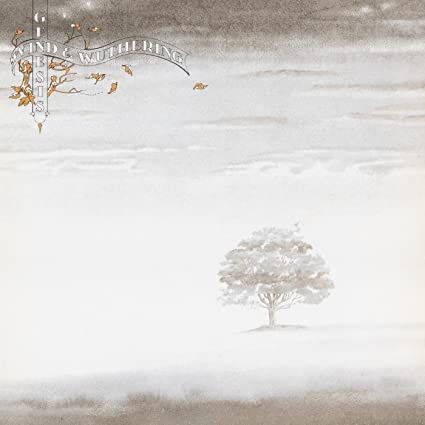
Goodness, Phil Collins was productive in ‘76! Two albums with Genesis , as well as the debut for Brand X. Perhaps a little strangely, coming after Trick of the Tail, Wind & Wuthering actually sounds more like the pre-Collins Gabriel Genesis. At least on the first two tracks, Eleventh Earl of Mar and One For the Vine.
Having just listened to several mid-70s Genesis albums in succession, it’s quite amazing, especially given how distinct both Peter Gabriel’s and Phil Collins’ voices are individually, how alike they are in the context of Genesis! Remarkable!!
There are, as with Trick, signs of the musical evolution of Genesis from prog behemoth to pop leviathan, even just within the many parts of the epic second track, most notably during a brief slightly disco-beat inflected segment. One For The Vine is properly prog-tastically enormous, clocking in at about ten minutes, and maintaining interest the entire time. Amazing to think music like this one cracked the upper reaches of the album charts!
What a cracking album! Your Own Special Way is an absolutely beautiful number. And whilst sounding totally ‘70s Genesis, does subtly hint at a gentle move towards pop melodicism, especially in the marvellously pretty choruses. Could this be my favourite Collins-era Genesis album. I certainly think so!
After the beautifully melodic mellowness of Your Own Special Way (a definite contender for my all time favourite Genesis track), we’re somewhat rudely awakened from our reverie with Wot Gorilla? A reminder that ‘76 was a Brand X year as well as a Genesis one! The music is very Genesis, but the drum rhythms are high-octane jazz-rock fusion.
After the brief blast that is Gorilla, we return to the more epic and lengthy soundscapes of All In A Mouse’s Night, whose cute lyrics are simultaneously very Gabriel-esque, if a little lighter. Again the keys-heavy sound is pure ‘70s Genesis, and gorgeous. But the drum sound is morphing into something more muscular, intense, and modern. A heavier direction other progsters – King Crimson spring to mind – would take to great extremes in years to come.
Blood On The Rooftops starts with some utterly gorgeous classical guitar from Steve Hackett, on what was to be his final album with Genesis. And then Collins comes in on vocals, and Banks on mellotron, and finally the whole band. And, lo, it was good! It’s worth noting that this was originally a love song, but new lyrics of a more cynical cast, about TV news were chosen instead. The juxtaposition is odd and unusual, but both music and lyrics are terrific, so that the odd marriage works extremely well.
Like Wot Gorilla, Unquiet Slumbers is uncharacteristically short, for Genesis. But otherwise it’s very unlike Gorilla. Both are instrumentals but where Gorilla is intense thanks to Collins’ Weather Report-ish drumming, Slumbers is spacious, mellow, and drum free.
As if to make up for this, it then segues into the rhythmically intense and bombastic In That Quiet Earth. Surely rather misleadingly titled, the power and energy here again bring Collins’ Brand X jazz-fusion chops to the party. But Banks’ synths keep things sufficiently Genesis to balance the fusion flavour.
The album winds up with Afterglow, which also returns us to the album’s more dominant mellow feel. Gorilla and Unquiet Slumbers were relatively aberrant, as overall this a gently intense slow-paced disc.
OTHER ALBUMS: Abacab, ‘81, Genesis, ‘83, Invisible Touch, ‘86, We Can’t Dance, ‘91, Calling All Stations, ‘97…
